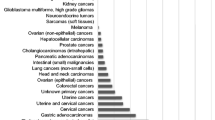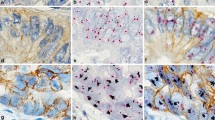Abstract
Introduction
Molecular targets are emerging rapidly and the development of clinical tests that simultaneously screen for multiple targets has become especially important. We assessed the gene expression levels of three known targets in advanced gastric cancer, epidermal growth factor receptor (EGFR), human epidermal growth factor 2 (HER2), and N-methyl-N-nitrosoguanidine human osteosarcoma transforming gene (MET), using the nCounter® assay (NanoString Technologies, Seattle, WA, USA) and compared these results with protein overexpression, detected by immunohistochemistry, to evaluate the performance of this new technology.
Methods
We investigated 42 formalin-fixed, paraffin-embedded tumor samples from patients with gastric cancer. A NanoString-based assay containing a 522 kinase gene panel was investigated. We analyzed the correlations between immunohistochemical findings and kinase gene expression levels of EGFR, HER2 and MET to validate this assay.
Results
EGFR, HER2, and MET overexpression were observed in 7 (16.6 %), 5 (11.9 %), and 3 (7.1 %) cases, respectively. For EGFR, HER2, and MET, the concordance rates between the NanoString-based assay results and the immunohistochemistry methods were 83.3, 97.6, and 100 %, respectively. Relative to immunohistochemistry findings, the NanoString-based assay sensitivities and specificities were 85.7 and 82.8 % for EGFR, 100 and 97.2 % for HER2, and 100 and 100 % for MET, respectively.
Conclusions
We found a high concordance between immunohistochemistry- and nCounter-based assessments of EGFR, HER2, and MET in advanced gastric cancer. Judged against immunohistochemistry results, the NanoString assay had high sensitivities and high specificities. These results suggest that the nCounter assay provides a reliable, high-throughput assay to simultaneously screen for the overexpression of several target proteins.



Similar content being viewed by others
References
Cunningham D, Jost LM, Purkalne G, Oliveira J. ESMO Minimum Clinical Recommendations for diagnosis, treatment and follow-up of gastric cancer. Ann Oncol. 2005;16(Suppl 1):i22–3.
Inoue M, Tsugane S. Epidemiology of gastric cancer in Japan. Postgrad Med J. 2005;81:419–24.
Jung KW, Park S, Kong HJ, Won YJ, Lee JY, Seo HG, et al. Cancer statistics in Korea: incidence, mortality, survival, and prevalence in 2009. Cancer Res Treat. 2012;44:11–24.
Yoo CH, Noh SH, Shin DW, Choi SH, Min JS. Recurrence following curative resection for gastric carcinoma. Br J Surg. 2000;87:236–42.
Landry J, Tepper JE, Wood WC, Moulton EO, Koerner F, Sullinger J. Patterns of failure following curative resection of gastric carcinoma. Int J Radiat Oncol Biol Phys. 1990;19:1357–62.
Lim DH, Kim DY, Kang MK, Kim YI, Kang WK, Park CK, et al. Patterns of failure in gastric carcinoma after D2 gastrectomy and chemoradiotherapy: a radiation oncologist’s view. Br J Cancer. 2004;91:11–7.
Manning G, Whyte DB, Martinez R, Hunter T, Sudarsanam S. The protein kinase complement of the human genome. Science. 2002;298:1912–34.
Blume-Jensen P, Hunter T. Oncogenic kinase signalling. Nature. 2001;411:355–65.
Demetri GD, von Mehren M, Blanke CD, Van den Abbeele AD, Eisenberg B, Roberts PJ, et al. Efficacy and safety of imatinib mesylate in advanced gastrointestinal stromal tumors. N Engl J Med. 2002;347:472–80.
Slamon DJ, Leyland-Jones B, Shak S, Fuchs H, Paton V, Bajamonde A, et al. Use of chemotherapy plus a monoclonal antibody against HER2 for metastatic breast cancer that overexpresses HER2. N Engl J Med. 2001;344:783–92.
Scagliotti GV, Novello S, von Pawel J. The emerging role of MET/HGF inhibitors in oncology. Cancer Treat Rev. 2013;39:793–801.
Luis M, Tavares A, Carvalho LS, Lara-Santos L, Araujo A, de Mello RA. Personalizing therapies for gastric cancer: molecular mechanisms and novel targeted therapies. World J Gastroenterol. 2013;19:6383–97.
Cunningham D, Humblet Y, Siena S, Khayat D, Bleiberg H, Santoro A, et al. Cetuximab monotherapy and cetuximab plus irinotecan in irinotecan-refractory metastatic colorectal cancer. N Engl J Med. 2004;351:337–45.
Jimeno A, Hidalgo M. Blockade of epidermal growth factor receptor (EGFR) activity. Crit Rev Oncol Hematol. 2005;53:179–92.
Bang YJ, Van Cutsem E, Feyereislova A, Chung HC, Shen L, Sawaki A, et al. Trastuzumab in combination with chemotherapy versus chemotherapy alone for treatment of HER2-positive advanced gastric or gastro-oesophageal junction cancer (ToGA): a phase 3, open-label, randomised controlled trial. Lancet. 2010;376:687–97.
Amemiya H, Kono K, Itakura J, Tang RF, Takahashi A, An FQ, et al. c-Met expression in gastric cancer with liver metastasis. Oncology. 2002;63:286–96.
Graziano F, Galluccio N, Lorenzini P, Ruzzo A, Canestrari E, D’Emidio S, et al. Genetic activation of the MET pathway and prognosis of patients with high-risk, radically resected gastric cancer. J Clin Oncol. 2011;29:4789–95.
Lee J, Seo JW, Jun HJ, Ki CS, Park SH, Park YS, et al. Impact of MET amplification on gastric cancer: possible roles as a novel prognostic marker and a potential therapeutic target. Oncol Rep. 2011;25:1517–24.
Lennerz JK, Kwak EL, Ackerman A, Michael M, Fox SB, Bergethon K, et al. MET amplification identifies a small and aggressive subgroup of esophagogastric adenocarcinoma with evidence of responsiveness to crizotinib. J Clin Oncol. 2011;29:4803–10.
Blumenschein GR Jr, Mills GB, Gonzalez-Angulo AM. Targeting the hepatocyte growth factor-cMET axis in cancer therapy. J Clin Oncol. 2012;30:3287–96.
Geiss GK, Bumgarner RE, Birditt B, Dahl T, Dowidar N, Dunaway DL, et al. Direct multiplexed measurement of gene expression with color-coded probe pairs. Nat Biotechnol. 2008;26:317–25.
Lee SJ, Lee J, Lee J, Park SH, Park JO, Park YS, et al. Phase II trial of capecitabine and everolimus (RAD001) combination in refractory gastric cancer patients. Invest New Drugs. 2013;31:1580–6.
Bachleitner-Hofmann T, Sun MY, Chen CT, Tang L, Song L, Zeng Z, et al. HER kinase activation confers resistance to MET tyrosine kinase inhibition in MET oncogene-addicted gastric cancer cells. Mol Cancer Ther. 2008;7:3499–508.
Ruschoff J, Hanna W, Bilous M, Hofmann M, Osamura RY, Penault-Llorca F, et al. HER2 testing in gastric cancer: a practical approach. Mod Pathol. 2012;25:637–50.
Ha SY, Lee J, Kang SY, Do IG, Ahn S, Park JO, et al. MET overexpression assessed by new interpretation method predicts gene amplification and poor survival in advanced gastric carcinomas. Mod Pathol. 2013;26:1632–41.
Cho EY, Choi YL, Han JJ, Kim KM, Oh YL. Expression and amplification of Her2, EGFR and cyclin D1 in breast cancer: immunohistochemistry and chromogenic in situ hybridization. Pathol Int. 2008;58:17–25.
Hsu JT, Chen TC, Tseng JH, Chiu CT, Liu KH, Yeh CN, et al. Impact of HER-2 overexpression/amplification on the prognosis of gastric cancer patients undergoing resection: a single-center study of 1,036 patients. Oncologist. 2011;16:1706–13.
Chen C, Yang JM, Hu TT, Xu TJ, Yan G, Hu SL, et al. Prognostic role of human epidermal growth factor receptor in gastric cancer: a systematic review and meta-analysis. Arch Med Res. 2013;44:380–9.
Lee J, Kim S, Kim P, Liu X, Lee T, Kim KM, et al. A novel proteomics-based clinical diagnostics technology identifies heterogeneity in activated signaling pathways in gastric cancers. PLoS One. 2013;8:e54644.
Acknowledgments
This work was supported by a grant from the Korean Health Technology R&D Project, Ministry of Health & Welfare, Republic of Korea (A102166, HI13C1951 and HI13C-2096). This study was supported by Samsung Biomedical Research Institute (#SMX1131871). This work was supported by grants from 20 by 20 project of Samsung Medical Center (GF01140111).
Conflict of interest
No potential conflicts of interest were disclosed by all authors.
Author information
Authors and Affiliations
Corresponding authors
Additional information
S. T. Kim and I.-G. Do contributed equally.
Rights and permissions
About this article
Cite this article
Kim, S.T., Do, IG., Lee, J. et al. The NanoString-based multigene assay as a novel platform to screen EGFR, HER2, and MET in patients with advanced gastric cancer. Clin Transl Oncol 17, 462–468 (2015). https://doi.org/10.1007/s12094-014-1258-7
Received:
Accepted:
Published:
Issue Date:
DOI: https://doi.org/10.1007/s12094-014-1258-7




